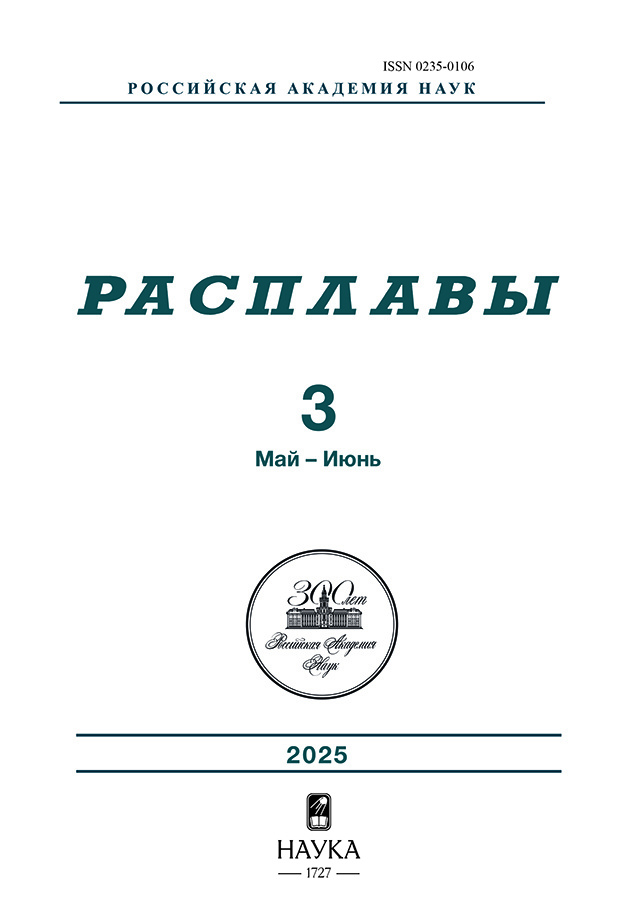Production of Al-Y alloy via electrolysis of KF-NaF-ALF3-Y2O3 melt
- Authors: Rudenko A.V.1, Filatov A.A.1, Suzdaltsev A.V.1,2
-
Affiliations:
- Institute of High-Temperature Electrochemistry UB RAS
- Ural Federal University
- Issue: No 3 (2025)
- Pages: 181-191
- Section: Articles
- URL: https://ruspoj.com/0235-0106/article/view/686287
- DOI: https://doi.org/10.31857/S0235010625030016
- ID: 686287
Cite item
Abstract
One of the ways to increase the efficiency of aluminum production is the use of low-temperature electrolytes and the production of demand aluminum master alloys. Earlier it was noted that it is effective to obtain aluminium master alloys via electrolysis of low-temperature electrolytes, allowing to arrange production without the need to obtain individual alloying elements and aluminium. It is relevant both from the practical and scientific point of view is the study of the possibility of obtaining aluminium master alloys with such electronegative elements as scandium, yttrium, strontium and calcium, etc. In this paper, the possibility of obtaining the Al-Y master alloy during electrolysis of a low-temperature electrolyte based on the KF-AlF3 system with the addition of Y2O3 at a temperature of 800°C was studied. For this purpose, the kinetics of the cathode process on a molybdenum and glassy carbon electrode was studied in the melt under study with different oxide content using chronovoltammetry method. It is shown that the addition of Y2O3 practically does not affect the voltampere dependences and the mechanism of the process, increasing the cathodic currents of reduction of aluminium and yttrium ions, as well as the anodic currents of oxidation of cathodic reaction products. Based on electrochemical measurements, it was assumed that the co-reduction of aluminum with yttrium is possible at current densities above 0.4-0.5 A/cm2. The process of obtaining Al-Y alloys in the KF-NaF-AlF3 melt with the addition of 1 wt% Y2O3 under conditions of aluminothermic synthesis and galvanostatic electrolysis of the melt at a cathodic current density of 0.5 and 1.0 A/cm2 was studied. As a result of aluminothermic reduction, an alloy with an yttrium content of no more than 0.07 wt.% was obtained, while during electrolysis, Al-Y master alloys with an yttrium content from 0.75 to 1.28 wt.% were obtained. The obtained values correspond to the extraction of yttrium from its oxide of 4.4; 47.5 and 81.3. It is suggested that the increase of synthesis duration and periodic loading of Y2O3 into the melt will allow to obtain Al-Y master alloys with increased yttrium content.
Full Text
About the authors
A. V. Rudenko
Institute of High-Temperature Electrochemistry UB RAS
Email: a.v.suzdaltsev@urfu.ru
Russian Federation, Ekaterinburg
A. A. Filatov
Institute of High-Temperature Electrochemistry UB RAS
Email: a.v.suzdaltsev@urfu.ru
Russian Federation, Ekaterinburg
A. V. Suzdaltsev
Institute of High-Temperature Electrochemistry UB RAS; Ural Federal University
Author for correspondence.
Email: a.v.suzdaltsev@urfu.ru
Russian Federation, Ekaterinburg; Ekaterinburg
References
- Li X., Lin J., Liu C., Liu A., Shi Z., Wang Z., Jiang S., Wang G., Liu F. Research on aluminum electrolysis from 1970 to 2023: A bibliometric analysis // JOM. 2024. 76. 3265–3274.
- Aarhaug T.A., Ratvik A.P. Aluminium primary production off-gas composition and emissions: An overview // JOM. 2019. 71. 2966–2977.
- Padamata S.K., Singh K., Haarberg G.M., Saevarsdottir G., Review-Primary production of aluminium with oxygen evolving anodes // J. Electrochem. Soc. 2023. 170. 073501.
- Kataev A.A., Karimov K.R., Chernov Ya.B., Kulik N.P., Malkov V.B., Antonov B.D., Vovkotrub E`.G., Zajkov Yu.P. Smachivanie nizkoplavkim kriolitom i zhidkim alyuminiem boridny`x katodny`x pokry`tij // Rasplavy`. 2009. № 6. 62–68. [In Russian]
- Yacenko S.P., Ovsyannikov B.V., Ardashev M.A., Sabirzyanov A.N. Cementacionnoe poluchenie «master-splava» iz ftoridno-xloridny`x rasplavov // Rasplavy.` 2006. №5. 29–36. [In Russian]
- Tkacheva O.Yu., Kataev A.A., Red`kin A.A., Rudenko A.V., Dedyuxin A.E., Zajkov Yu.P. Flyusy` dlya polucheniya splavov alyuminij-bor // Rasplavy`. 2016. № 5. 387–396. [In Russian]
- Moskvitin V.I., Maxov S.V. O vozmozhnosti polucheniya alyuminievo-skandievoj ligatury` v alyuminievom e`lektrolizere // Czvetny`e metally`. 1998. № 7. 43–46. [In Russian]
- Nerubashhenko V.V., Kry`mov A.P., Galochka V.G., Napalkov V.I., Tarary`shkin V.I. Poluchenie alyuminievy`x ligatur v e`lektrolizny`x vannax // Czvetny`e metally.` 1980. №12. 47–48. [In Russian]
- Suzdal`cev A.V., Filatov A.A., Nikolaev A.Yu., Pankratov A.A., Molchanova N.G., Zajkov Yu.P. Izvlechenie skandiya i cirkoniya iz ix oksidov pri e`lektrolize oksidno-ftoridny`x rasplavov // Rasplavy.` 2018. №1. 5–13. [In Russian]
- Suzdal`cev A.V., Nikolaev A.Yu., Zajkov Yu.P. Obzor sovremenny`x sposobov polucheniya ligatur Al-Sc // Czvetny`e metally`. 2018. №1. 69–73. [In Russian]
- Bazhin V.Yu., Kosov Ya.I., Lobacheva O.L., Dzhevaga N.V. Sintez skandievo-ittrievy`x ligatur na osnove alyuminiya // Metally`. 2015. № 4. 9–14. [In Russian]
- Men`shikova S.G., Shirinkina I.G., Brodova I.G., Brazhkin V.V. Struktura splava Al90Y10 pri kristallizacii pod davleniem // Rasplavy`. 2019. № 1. 18–23. [In Russian]
- Gilev I.O., Shubin A.B., Kotenkov P.V. Termodinamicheskie svojstva rasplavov binarnoj sistemy` Al–Y // Rasplavy`. 2021. № 5. 469–481. [In Russian]
- Rudenko A.V., Tkacheva O.Y., Kataev A.A. Low-temperature electrolytic production of aluminum–REM alloys in cryolite melts // Rus. Metall. 2023. 2023. 1069–1075.
- Nikolaev A.Yu., Yasinskij A.S., Suzdal`cev A.V., Polyakov P.V., Zajkov Yu.P. Vol`tamperometriya v rasplave i suspenziyax // Rasplavy`. 2017. №3. 214–225. [In Russian]
- Wei Z., Peng J., Wang Y., Liu K., Di Y., Sun T. Cathodic process of aluminum deposition in melts with low cryolite ratio // Ionics. 2019. 25. 1735–1745.
- Suzdal`cev A.V., Xramov A.P., Zajkov Yu.P. Uglerodny`j e`lektrod dlya e`lektroximicheskix issledovanij v kriolit-glinozemny`x rasplavax pri 700 – 960°C // E`lektroximiya 2012. 48. 1251–1263.
- Rudenko A.V., Tkacheva O.Yu. Dynamic viscosity of cryolite melts with and additions // Rus. Metall. 2024. 2024. 233–238. [In Russian]
- Ambrova M., Jurisova J., Danielik V., Gabcova J. On the solubility of lanthanum oxide in molten alkali fluorides // J. Therm. Anal. Calorim. 2008. 91. 569–573.
- Liu Sh., Du Y., Chen H. A thermodynamic reassessment of the Al–Y system // Computer Coupling of Phase Diagrams and Thermochemistry. 2006. 30. 334–340.
Supplementary files














